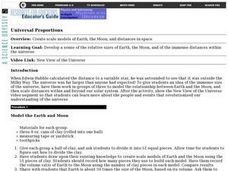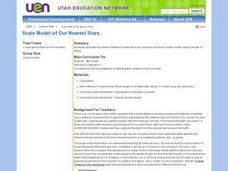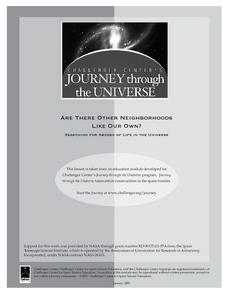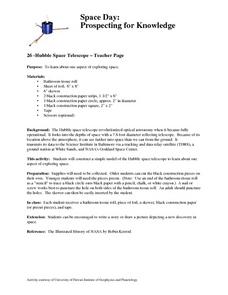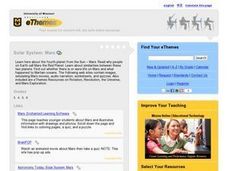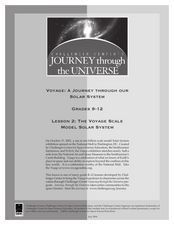Columbus City Schools
Moon Phase Mania
Now you see it, now you don't. Our moon seems to pull a disappearing act from time to time—but why? Take your seventh grade scientists above and beyond to discover the truth about the moon and the role it plays in Earth's little...
Laboratory for Atmospheric and Space Physics
Charting the Progress of New Horizons
In 2006, New Horizons began its mission to fly to Pluto. As it continues its journey, scholars track its progress with the help of an informative website, all the while reinforcing measurement concepts with the construction of a scaled...
American Museum of Natural History
Beyond Planet Earth
Scholars take a journey through space with 16 eye-catching images. Along the way, learners read captions starting with the moon, then move onto asteroids, Mars, and Jupiter.
Laboratory for Atmospheric and Space Physics
Space Travel Guide
Looking to take a trip? Why not go to space? Here, scholars take on the role as travel agent to create a guide to their favorite planet including travel tips and sightseeing recommendations.
Laboratory for Atmospheric and Space Physics
Jupiter’s Relative Size
How do you properly illustrate the extreme size difference between two planets—Earth and Jupiter? With the help of jellybeans, of course! Create a scale model of Jupiter's mass compared to Earth using a fishbowl, 1,400 beans, and a...
Curated OER
Planet/Constellation Mobile
Middle schoolers construct three-dimensional solar system mobiles.
Curated OER
The Sun in Our Lives
Third graders identify the different parts of the sun. In this astronomy instructional activity, 3rd graders examine how the sun's energy drive life processes on Earth. They construct a model of a solar system using large rolls of toilet...
Curated OER
Universal Proportions: Earth and Moon
Students create scale models of Earth, the Moon, and the distances within the universe. Working in groups, they construct their models of Earth and the Moon on a scale of 50:1 and calculate how far apart to place their models. They...
Curated OER
Scale Model of Our Nearest Stars
Sixth graders calculate a light day, light hour, and light minute from the standard of a light year. After establishing the distances, a one meter scale is created to demonstrate the distance between the sun and the planets of our solar...
Curated OER
The Earth
Third graders examine the relationship between the Earth and the Sun. They define key vocabulary terms, and in small groups conduct Internet research, exploring a variety of websites. Students answer comprehension questions, and...
Curated OER
Moon WebQuest
Third graders research basic information about the moon and identify the phases and order of the phases of the moon. They conduct Internet research, complete a moon WebQuest, and write a magazine article about the moon using their...
California Academy of Science
Kinesthetic Astronomy: Mars Opposition Dance
Your class will watch as one child orbits the sun as Earth, while another orbits as Mars. If the timing is right, they will see the repetitive dance between the two planets and discover how often they are opposite from each other. For...
Curated OER
Solar Powered Cars
Students build and race solar powered cars after a teacher lecture. They answer questions based on their experiences with the car they build.
Curated OER
Metrics And Measurements
Middle schoolers engage in a study of measuring distances between geographical locations on a map. They are able to define and use the map scale in conjunction with the metric system. For this lesson plan they make their own maps and...
Curated OER
Exploring the Universe
Learners conduct Internet research to find information about each planet and present their findings to the class. Students research statistical information and two interesting facts about each planet, then create a multimedia...
Curated OER
Are There Other Neighborhoods Like Our Own?
Students investigate the possibility of life existing on other planets. They conduct research using a variety of resources. The lesson includes an overview that is used for classroom discussion practices. They tell the teacher how to...
Curated OER
Out of This World and Into Our Classroom
Students complete a background survey on technology to determine where they need to focus on to complete this project. Using the Internet, they research a topic in Astronomy they are interested in and determine what math concepts are...
Curated OER
Spacd Day:Probing For Knowledge
Students investigate the uses and purpose of the Hubble telescope. They create a model of the telescope and conduct research about the history behind the invention of it. Students use the information in order to create a context for the...
Curated OER
Using the Internet
For this using the internet worksheet, students search several websites to review information about the heart, human senses, the solar system, and planets. Students also read information about the rock cycle and answer provided questions.
Teach Engineering
Capturing the Sun's Warmth
Passive solar heating is a technology that's been in use for thousands of years. Here, elementary schoolers are exposed to this type of heating, the materials that are used in passive solar heating, and they study how engineers design...
Curated OER
Solar System: Mars
Learners research Mars, read why it is called the Red Planet and find out whether there is or was life on Mars.
Curated OER
The Voyage Scale
Pupils identify how models are powerful tools of exploration and that the sizes of the planets and distances between the planets in the Solar System span a large range. They make a sign for each planet they have created in the lesson...
Curated OER
Hello, Anybody Out There?
Students understand that people believe there may be life in other solar systems. In this communication with other solar systems lesson, students analyze our planet and write things they want to communicate to other solar systems.
Curated OER
In a Galaxy Far, Far, Far Away
Sixth graders compare distances between objects in the solar system. They investigate how light years are measured and when using them to measure how distances compare with one another. They write an essay exploring the possibility of...









